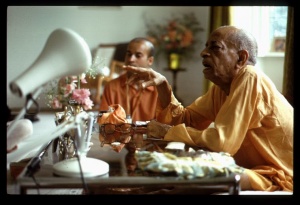SB 1.13.13: Difference between revisions
m (1 revision(s)) |
(Vanibot #0054 edit - transform synonyms into clickable links, which search similar occurrences) |
||
| (One intermediate revision by one other user not shown) | |||
| Line 1: | Line 1: | ||
{{info | {{info | ||
|speaker= | |speaker=Sūta Gosvāmī | ||
|listener=Sages of | |listener=Sages of Naimiṣāraṇya | ||
}} | }} | ||
[[Category:Srimad-Bhagavatam - Canto 01 Chapter 13]] | |||
[[Category:Bhagavatam Verses Spoken by Suta Gosvami - Vanisource|011313]] | |||
<div style="float:left">'''[[Srimad-Bhagavatam]] - [[SB 1|First Canto]] - [[SB 1.13: Dhrtarastra Quits Home|Chapter 13: Dhṛtarāṣṭra Quits Home]]'''</div> | |||
<div style="float:right">[[File:Go-previous.png|link=SB 1.13.12]] '''[[SB 1.13.12]] - [[SB 1.13.14]]''' [[File:Go-next.png|link=SB 1.13.14]]</div> | |||
{{CompareVersions|SB|1.13.13|SB 1965|SB 1972-77}} | |||
{{RandomImage}} | |||
==== TEXT 13 ==== | ==== TEXT 13 ==== | ||
<div class="verse"> | |||
<div | :nanv apriyaṁ durviṣahaṁ | ||
nanv apriyaṁ durviṣahaṁ | :nṛṇāṁ svayam upasthitam | ||
nṛṇāṁ svayam upasthitam | :nāvedayat sakaruṇo | ||
nāvedayat sakaruṇo | :duḥkhitān draṣṭum akṣamaḥ | ||
duḥkhitān draṣṭum akṣamaḥ | |||
</div> | </div> | ||
| Line 18: | Line 23: | ||
==== SYNONYMS ==== | ==== SYNONYMS ==== | ||
<div class="synonyms"> | |||
<div | ''[//vanipedia.org/wiki/Special:VaniSearch?s=nanu&tab=syno_o&ds=1 nanu]'' — as a matter of fact; ''[//vanipedia.org/wiki/Special:VaniSearch?s=apriyam&tab=syno_o&ds=1 apriyam]'' — unpalatable; ''[//vanipedia.org/wiki/Special:VaniSearch?s=durviṣaham&tab=syno_o&ds=1 durviṣaham]'' — unbearable; ''[//vanipedia.org/wiki/Special:VaniSearch?s=nṛṇām&tab=syno_o&ds=1 nṛṇām]'' — of humankind; ''[//vanipedia.org/wiki/Special:VaniSearch?s=svayam&tab=syno_o&ds=1 svayam]'' — in its own way; ''[//vanipedia.org/wiki/Special:VaniSearch?s=upasthitam&tab=syno_o&ds=1 upasthitam]'' — appearance; ''[//vanipedia.org/wiki/Special:VaniSearch?s=na&tab=syno_o&ds=1 na]'' — did not; ''[//vanipedia.org/wiki/Special:VaniSearch?s=āvedayat&tab=syno_o&ds=1 āvedayat]'' — expressed; ''[//vanipedia.org/wiki/Special:VaniSearch?s=sakaruṇaḥ&tab=syno_o&ds=1 sakaruṇaḥ]'' — compassionate; ''[//vanipedia.org/wiki/Special:VaniSearch?s=duḥkhitān&tab=syno_o&ds=1 duḥkhitān]'' — distressed; ''[//vanipedia.org/wiki/Special:VaniSearch?s=draṣṭum&tab=syno_o&ds=1 draṣṭum]'' — to see; ''[//vanipedia.org/wiki/Special:VaniSearch?s=akṣamaḥ&tab=syno_o&ds=1 akṣamaḥ]'' — unable. | ||
</div> | </div> | ||
| Line 26: | Line 30: | ||
==== TRANSLATION ==== | ==== TRANSLATION ==== | ||
<div class="translation"> | |||
<div | |||
Compassionate Mahātmā Vidura could not stand to see the Pāṇḍavas distressed at any time. Therefore he did not disclose this unpalatable and unbearable incident because calamities come of their own accord. | Compassionate Mahātmā Vidura could not stand to see the Pāṇḍavas distressed at any time. Therefore he did not disclose this unpalatable and unbearable incident because calamities come of their own accord. | ||
</div> | </div> | ||
| Line 34: | Line 37: | ||
==== PURPORT ==== | ==== PURPORT ==== | ||
<div class="purport"> | |||
According to ''Nīti-śāstra'' (civic laws) one should not speak an unpalatable truth to cause distress to others. Distress comes upon us in its own way by the laws of nature, so one should not aggravate it by propaganda. For a compassionate soul like Vidura, especially in his dealings with the beloved Pāṇḍavas, it was almost impossible to disclose an unpalatable piece of news like the annihilation of the Yadu dynasty. Therefore he purposely refrained from it. | |||
</div> | |||
<div | |||
<div style="float:right; clear:both;">[[File:Go-previous.png|link=SB 1.13.12]] '''[[SB 1.13.12]] - [[SB 1.13.14]]''' [[File:Go-next.png|link=SB 1.13.14]]</div> | |||
</div> | __NOTOC__ | ||
__NOTOC__ | __NOEDITSECTION__ | ||
Latest revision as of 17:57, 17 February 2024

A.C. Bhaktivedanta Swami Prabhupada
TEXT 13
- nanv apriyaṁ durviṣahaṁ
- nṛṇāṁ svayam upasthitam
- nāvedayat sakaruṇo
- duḥkhitān draṣṭum akṣamaḥ
SYNONYMS
nanu — as a matter of fact; apriyam — unpalatable; durviṣaham — unbearable; nṛṇām — of humankind; svayam — in its own way; upasthitam — appearance; na — did not; āvedayat — expressed; sakaruṇaḥ — compassionate; duḥkhitān — distressed; draṣṭum — to see; akṣamaḥ — unable.
TRANSLATION
Compassionate Mahātmā Vidura could not stand to see the Pāṇḍavas distressed at any time. Therefore he did not disclose this unpalatable and unbearable incident because calamities come of their own accord.
PURPORT
According to Nīti-śāstra (civic laws) one should not speak an unpalatable truth to cause distress to others. Distress comes upon us in its own way by the laws of nature, so one should not aggravate it by propaganda. For a compassionate soul like Vidura, especially in his dealings with the beloved Pāṇḍavas, it was almost impossible to disclose an unpalatable piece of news like the annihilation of the Yadu dynasty. Therefore he purposely refrained from it.